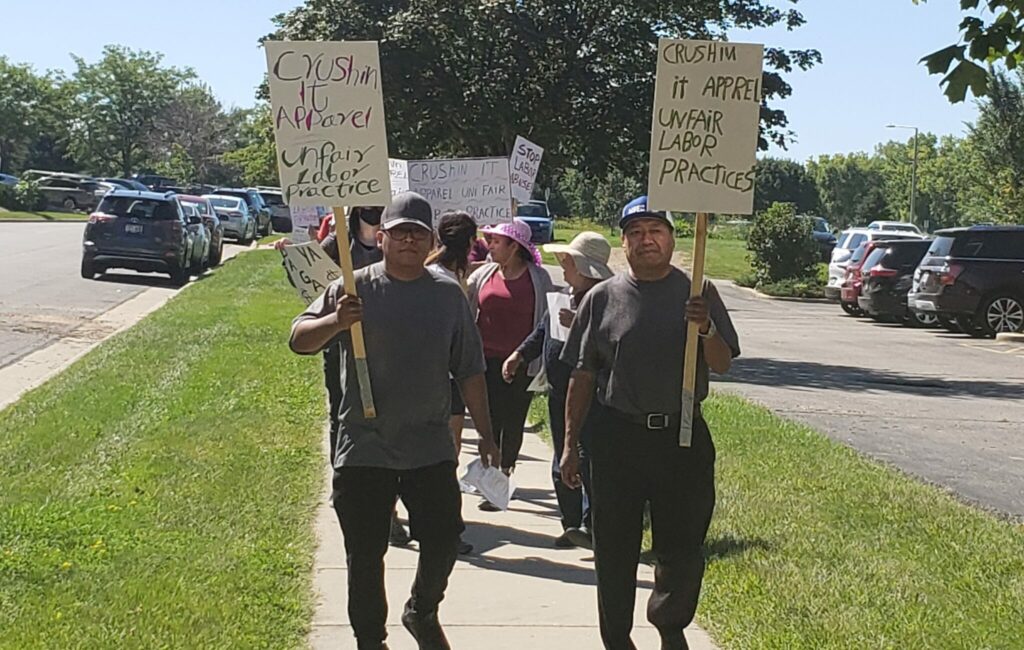BY ERIK GUNN – APRIL 11, 2024 6:49 PM
A Madison apparel company, which drew attention a year and a half ago when nonunion workers protested their working conditions and filed a federal complaint against the firm, has been sued for wage theft.
The lawsuit, filed Tuesday against Crushin’ It Promotions LLC by the Wisconsin Department of Justice, names successor companies as well as the company’s owner, Jeremy Kruk, and asserts they are culpable for the back wages the company allegedly failed to pay as well as penalties.
“All of the non-individual Principal Defendants are alter egos of Jeremy Kruk,” the lawsuit states. “Kruk exercised complete domination and control over all aspects of the relevant business transactions related to this complaint, such that corporate formalities should be disregarded.”
Wisconsin Attorney General Josh Kaul filed the lawsuit on behalf of the Wisconsin Department of Workforce Development (DWD), which brought the wage theft case on behalf of former employees of the business, a manufacturer of sportswear.
Kruk did not respond to an email message seeking comment Thursday.
In late summer of 2022 employees of the company filed a charge against the business with the National Labor Relations Board after a group petitioned Kruk to address their concerns about working conditions and safety.
According to the lawsuit, in November 2022 workers voted to join the International Union of Painters and Allied Trades and Kruk fired them. The workers and the union filed an unfair labor practice charge with the NLRB, which ordered the company to reinstate the workers and pay their back wages in June 2023.
“Kruk disregarded the NLRB order and instead shut down Crushin It Apparel and reopened the same business under a new name, Thunder Bay, in a new location,” the lawsuit states.
The wage theft complaint predates the NLRB charges. In April 2022, after one employee reported unpaid wages to DWD, the agency investigated and found another 10 employees also had unpaid wages, the lawsuit states. DWD determined that the 11 were owed $8,230 altogether. The lawsuit states Kruk’s failure to pay the back wages was “willful” and qualifies for a penalty of an additional 100% of the unpaid wages.
While still owing the unpaid wages Kruk transferred the company’s assets to at least two other businesses “to hinder, delay or defraud the Employees,” rendering Crushin’ It Promotions insolvent, the lawsuit states.
One of those companies, ADK Promotions, was incorporated in August 2023 “to avoid the predecessor company, Crushin It LLC’s liability to the Employees,” the lawsuit states. “ADK Promotions, Inc., is therefore a successor to Crushin It, LLC’s liability to the Employees for unpaid wages plus any penalty wages ordered and is liable for the same.”
The suit asks the court to void the asset transfers and put a lien on the assets. DWD filed a lien against the company in September 2022 in the wage theft case. A half-dozen individuals and businesses, including the Wisconsin Department of Revenue and the painters’ union, have also filed claims against the company in Dane and Rock counties.
The lawsuit asks the court to give DWD’s lien priority over all other claims and to apply “all personal property that was located in Wisconsin when the wage lien was perfected” to the wage theft claim — including property transferred under transactions that the lawsuit seeks to have the court cancel.
The Crushin It employees have been aided by Worker Justice Wisconsin, an interfaith organization that assists nonunion workers. It helped them connect with the painters’ union and file their wage claims, although it was not involved in the new lawsuit, said Rebecca Meier-Rao, the group’s executive director.
“We hope that the fact that the AG decided to sue Kruk for the wages he stole from Crushin’ It employees sends a message to workers that they deserve the wages they have earned, and that they should stand up for themselves when they have been stolen,” Meier-Rao said, “and to employers that they must pay their workers the wages they’re owed always.”

